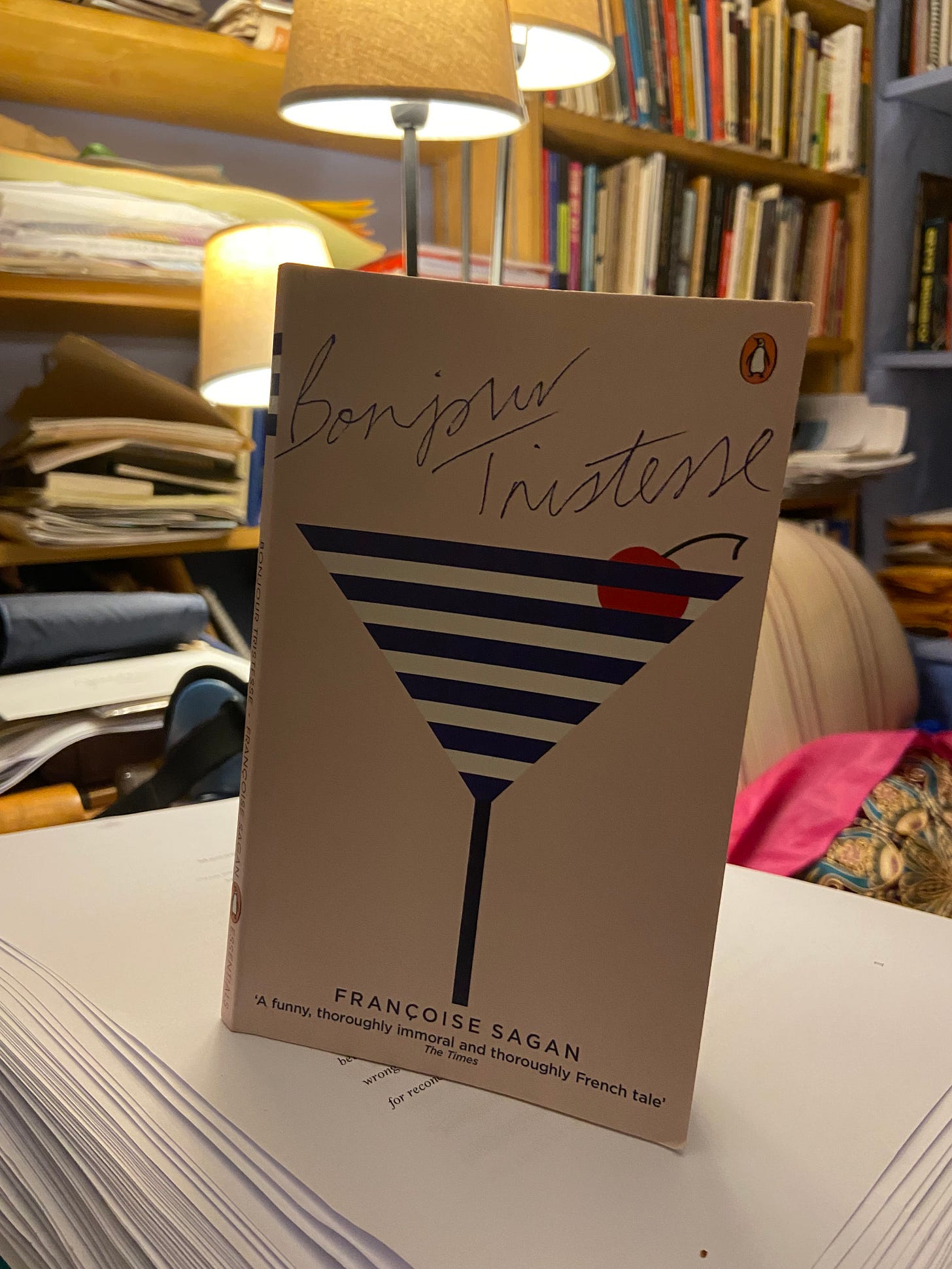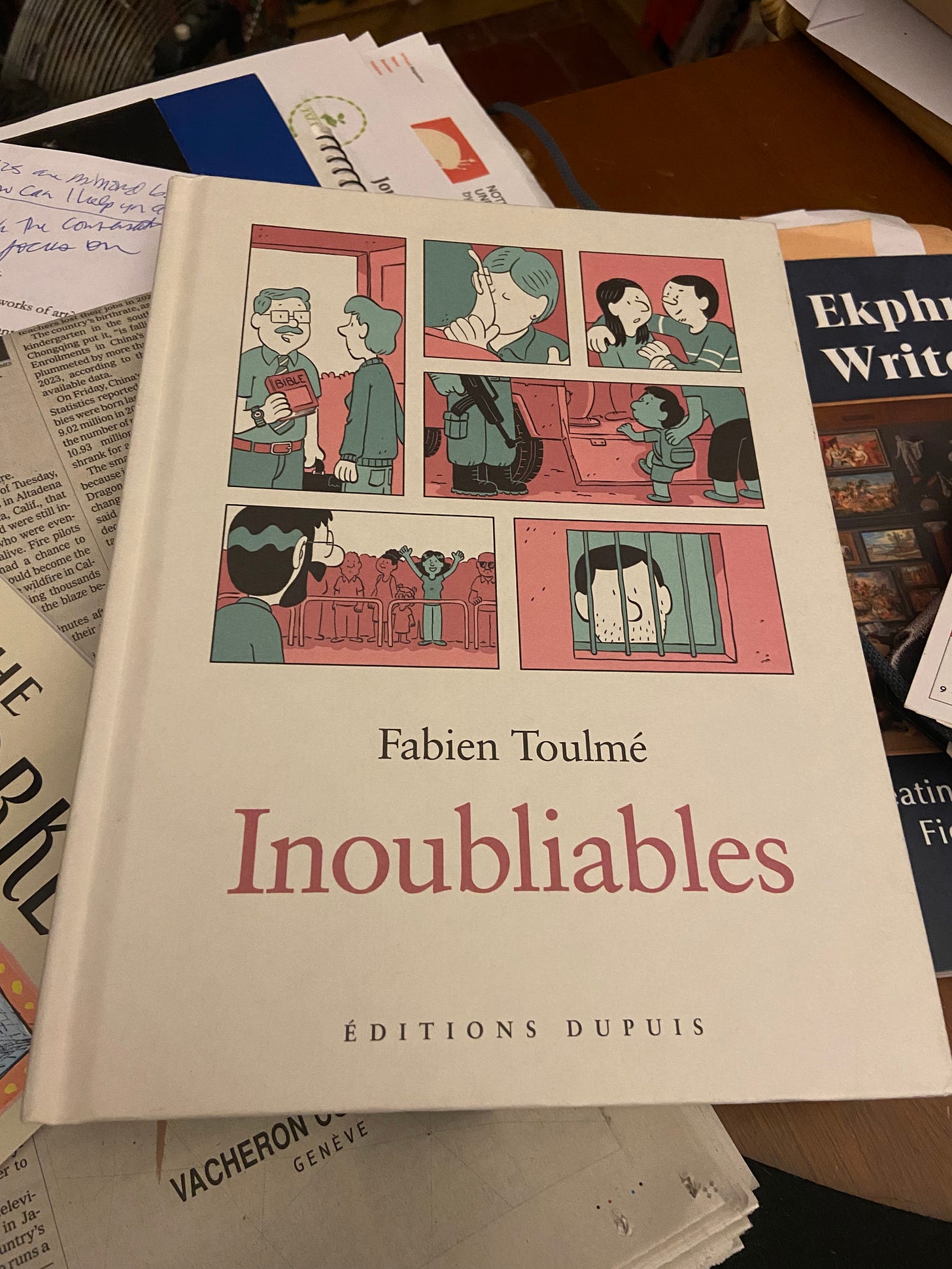Wanting Impossible Things
I want books to not fail me, I want life to be fair, and also I want to pick on Jane Austen a little (don't hate me!)
Last week, I was in my pre-chemo, fretful-toddler state when I sat down to lunch. I picked up a new book to read, We All Want Impossible Things by Catherine Newman. I knew it was about a friend helping another friend who was dying of cancer. But it was recommended to me. The writing is sharp and funny, but on page thirteen I encountered this: “Edi, like most people with ovarian cancer, will die… because her guts stopped working. What will kill her, ultimately, is (spoiler alert) bowel obstruction and malabsorption, catastrophic electrolyte imbalance and then kidney or liver failure.”
I felt like I’d been punched in the sternum. I knew it was about cancer, but not my cancer. Not only my cancer, but my situation. My symptoms. I recently had a subobstruction in my bowels, which are still not working properly. I read the paragraph to Tim.
“Why don’t you stop reading it?” he said.
“I thought maybe it might prepare me for the future, for what might come.” I set the book down on the table and got ready to leave for chemo, gathering the towel, washcloth, meds, forms, food, tea, and books. Reminded myself I am lucky to have chemo. To know that it is working. And then I burst into tears.
“I don’t want to die!” I wailed, stupidly, futilely. The book made it all seem rather immediate.
I rarely shed actual tears because 1) antidepressants and 2) they don’t help. But I did last week.
At the hospital, I was assigned to the doctor I like the least, a stern, unsmiling woman who has never uttered a single gentle word. She asked how I was and I said, as if it were not obvious, given that I was still crying, that I was sad. “What is the use of being sad?” she said, angrily.
I had disappointed her. I was weak, pathetic.
I conceded there was no use, but that sometimes emotions became unavoidable. I told her that I was reading a book about a woman dying of ovarian cancer. “Do you want me to throw it in the bin?” she said, holding out her hand. I was unsure if she were serious. I shook my head. Throw out a book?
At least she didn’t let me wallow. I told her, in my defense, that I was not idle, that I was keeping very busy, that I was working constantly. She said that was good, that I had to just march on as long as I could.
The problem is, We All Want Impossible Things is good. The dialogue is funny. The main character (the healthy one) speaks to her daughter the way I often speak with Theo. I wanted to keep reading it. I read some more while waiting for chemo, hoping not to get to any of the gory death bits. But flipping ahead, I saw evidence of gruesome scenes, of excruciating pain, of utter misery, of the failures of medicine. Maybe I couldn’t actually read it. I wasn’t sure what to do.
Reader, I finished it. Without crying. While I liked the book a great deal, it also irritated me to read the story from the point of view of the healthy person, the person not afflicted with active terminal illness. I wanted to hear from the dying person. She was the one who might give me something to hold onto as I navigate this. I want to see things through her eyes, find out how she copes with leaving her child and husband behind, how she makes it bearable. But it was very much a book about the living. Don’t the living have enough books about them?
This past weekend was a blur of post-chemo misery and exhaustion. I struggled to exercise, to work, to be civil to people, to think. A grey mist fell over my brain, weighing it down. I couldn’t write. My muscles cramped when I tried to sleep.
By some miracle, the fog dissipated Monday morning, and I immediately wrote for thirteen hours, wanting to make the most of my lucid days. I’m still feeling well, but am bracing myself for the next go on the rollercoaster, as I have chemo tomorrow.
In bed at night, I’ve been reading a French graphic novel, or rather a graphic collection of short, true stories: Fabien Toulmé’s book Inoubliables. (Unforgettables). Each story is based on an interview with a different person in a different country. It’s engaging, and I can actually read it in French without having to stop and look things up. They are emotionally tough stories, set in Paris, Rwanda, Brittany, Toulouse, Lourdes, and elsewhere. But moving.
Oh! And I am also reading Bonjour Tristesse, the scandalous novel published in France by Julliard in 1954. I’ll let you know my thoughts when I finish.
On my walks, I have been listening to all of Jane Austen’s novels in a row. Finished the last one today. And at the risk of alienating most of my readers, I must confess that I find very little in them to enjoy. Austen exhibits so much contempt in her depictions of women, save her heroines. I get that they are satires, but still. I struggled to merely tolerate them.
I realize this may have more to do with me and my frustrations with the historical confinement of women than with the books themselves, but reading them felt like watching panthers in a cage. All these women, their energies and brains wasted in idleness. Nearly every character of every book is both loathesome and dull. I read Mansfield Park first, meaning I almost didn’t get to the others because I despised prissy little Fanny so much.
I know it’s unfair of me to be cross with Austen for things that are just of her time. She can’t help writing about nothing but marriage and money because what else was there for women to think about? But marriage, money, and social climbing, especially as narrative devices, don’t interest me. Not unless the book begins a decade into a marriage, when things really get interesting.
Austen’s women are nearly all vain, foolish, profligate, shallow, selfish, materialistic, and immoral. There is usually just one sensible heroine while the rest torment her with their silliness and cruelty. It’s also excruciating to endure book after book in which young girls and women have no aspirations at all other than marrying well. I realize they had no other options, but not to even have a longing to pursue something? Not even to have a curiosity about the world? A desire to study frogs, the mysteries of the night sky, medicine, sculpture? Anything! But what models did they have? What freedom? It puzzled me that none ever felt frustration with their lot. Perhaps such an emotion would have irritated publishers.
These women live constantly belittled and demeaned and restricted and pretend it is enough. Pretend a good man can rescue them. I find nothing romantic in the narratives. Wait until these heroines realize that marriages are essentially indentured servitude! Particularly uninteresting is that the books are all about people of vast privilege, who do not have to work, who never even consider it. I was vicariously bored every time they picked up their needlepoint or laid out the cards for bridge. Life without meaningful work is no life at all.
A few elements of style and prose consistently drove me crazy. First, the characters incessantly use the phrase “in all the world,” as in: “She is the best friend in all the world!” “I am the happiest girl in all the world!” “It was the most comfortable drawing room in all the world!” “I would not injure you for all the world!” “He was the most charming man in all the world!” The phrase appears dozens and dozens of times in each book, every character uses them, and each time I marvel at the shocking and universal lack of originality. Surely someone has written a thesis on the monotonous ubiquity of this phrase. The repetition is perhaps particularly noticeable when one is reading all of the books in a row. Surely once in awhile a character could say, “I would not injure him for all the tea in China!” or “Surely there is not in all of Christiandom a man so handsome!”
Every book, as you well know, builds to marriage. The entire plot is focused on getting these two young people to fall in love and end up together. But every single time we finally get to the scene in which the characters confess their love and become engaged, every single time we seek the reward for enduring all of their previous miseries, Austen denies us. While she can write ten-page dialogues about the weather or women’s clothing, when it comes to the most important scene in the book, she does not write it. She conceals it from us.
We never get to hear what the lovers say to each other at the moment they finally come together and become engaged. She abruptly just sums it up in the vaguest of terms, leaving me deeply unsatisfied, deprived of what we have been waiting the whole book to hear. Instead of staying in the scene with the lovers, allowing us to hear their words and see their actions, she says something like, “and in the next three hours they had much to discuss and profess, and many tender things to say, and clear up all their miscommunications etc.”
Where was her editor? Why does she consistently shy away from the main reason most people must have read her? Why the sudden summing up at the end, denying us any moving dialogue (though they would probably say something like “I would not for all the world marry anyone but you!). It’s maddening. There are literally no exceptions to this.
I do not deny Austen’s witty writing, her deftness with subtext, or her greatness, particularly for her time. But I don’t think she could ever be a favorite of mine. (I am now expecting a flood of enraged comments from her fans, but my opinions injure no one and surely will do nothing to tarnish her reputation).
My least favorite was Mansfield Park, for the aforementioned reason, followed by Northanger Abbey, which possessed not one character interesting or intelligent enough to engage me. If I had to choose a favorite, I suppose it would be Pride & Prejudice. Sense & Sensibility was mildly entertaining, but I was disturbed to see Marianne married off to a man more than twice her age. It was an unconvincing ending for her.
Speaking of unconvincing endings… I must get myself to bed. Cytotoxins tomorrow!
Thank you so much for your comments and messages. I love to hear your thoughts and opinions. There are no better readers than you in all the world!







As I recall, I think Dewey Ganzel would support you critiquing Austen. Have at it, sister! And my goodness, my heart breaks for you, and for all of us that want you to live forever. Love and best wishes, Daniel
I laughed at that wonderful Jane Eyre reference!
I don’t know how you move from chemo to chemo. I don’t think I could have read We all Wish for Impossible Things. You are - through these posts - writing the point of view you wish to read.
There is another - a book I loved. When Breath becomes Air by Paul Kalanithi. Written (mostly) by an American neurosurgeon and it is a beautiful read.